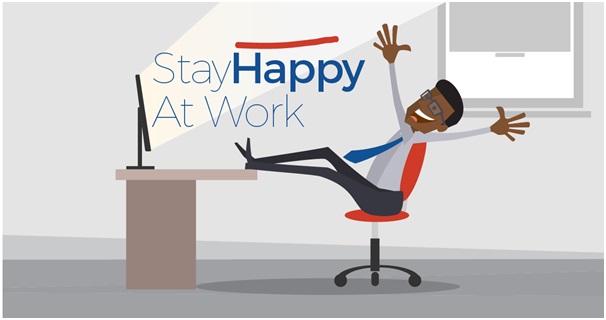
The Secret to Being Happy at Work
What do you mean by Happy at Work?
It is an emotion, a sense of well-being, that arises when we are satisfied with our work and involved in our “professional commitment.” On the most fundamental level, occupational happiness arises when:
- We enjoy doing the tasks that have been assigned to us.
- We have a good feeling about the people we work with.
- We are satisfied with the monetary benefits we receive from our jobs.
- We have the opportunity to improve our current skills.
- We are valued and acknowledged at work.
Workplace happiness is more than just a result of good planning and good results. Personality qualities, perceptive level, underlying psychological pressures, and emotional intelligence are all factors that influence our level of comfort in a professional context.
The Importance of Happiness at Work
Employee enjoyment and productivity are not novel concepts, and employee satisfaction is critical. Being happy requires more than being content with one’s job; it also entails being content with one’s work. It’s self-evident that how we feel at work has a ripple effect on other areas of our lives. If something brings us delight, it may have a favourable effect on those around us.
Workplace Happiness and Its Effects
- Happiness aids achievement in many spheres of life.
- Employees that are happy with their jobs have better physical and mental health.
- Employees that are happy in their jobs are more charitable.
- Employees who are happy are more approachable.
- Happiness enlightens the intellect and gives you more energy.
- Employees that are happy in their jobs have more good interpersonal relationships.
- Happiness helps to enhance life expectancy.
- Employees that are happy in their jobs are more resilient.
Ways to be Happy at Work:
- Find a job that you enjoy
For some, fulfilling career may entail securing a position that allows them to showcase their strengths. In other cases, an enjoyable career could be one that you are passionate about or that you find personally satisfying.
Every person does not enjoy their job every day, and even careers that are personally rewarding can be difficult or monotonous at times. However, if you enjoy and are proud of your job, you are more likely to be happy at work. Examine yourself, your abilities, and your interests to determine what you can do each day.
- Look for a job that allows you to spend time outside of work.
Not everyone needs a job that piques their interest or reflects their personal ideas. For many people, a job allows them to retain an out-of-office lifestyle that they like.
Consider how you want your life to play out. Do you want free nights and weekends to socialise? Do you have a plenty of vacation time to pursue your interests? A regular schedule that allows you to spend every night with your children?
Even if you do not find a job that you love, if you love the life, it allows you to live, you are more likely to be happy at work.
- Make Only Trustworthy Commitments
Failure to keep commitments is a major source of workplace stress and unhappiness. Employees frequently spend more time making excuses for not keeping a commitment and fretting over the repercussions of incomplete assignments than they do actually working.
Develop a method for tracking your obligations and managing your schedule in order to alleviate work-related stress and discontent. Maintain sufficient organisation to determine promptly and accurately whether you are capable of accepting a request or new assignment. If you are pressed for time, avoid volunteering for more work or office obligations.
- Make fewer decisions.
Decision fatigue is a real thing: each decision depletes your cognitive resources, making following decisions more difficult. This can quickly bore you and leave you feeling weary.
- End your workday with a little moment of gratitude.
The bad news is that our brains remember the traumatic events more than the pleasant ones. For example, one study revealed that the negative impact of setbacks at work was three times that of growth.
We have been conditioned by evolution to seek out and focus on what is wrong: this helps us avoid danger, which is fantastic, but makes it more difficult to feel happy. The good news is that you can train your brain to remember more pleasant events. In other words, you may overcome your fundamental negativity.
